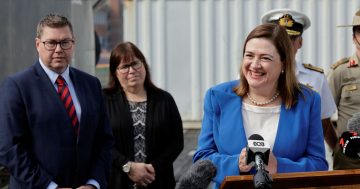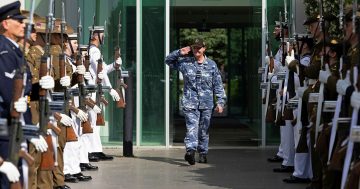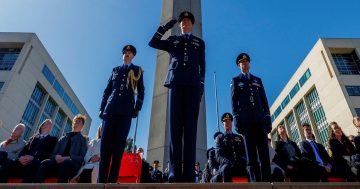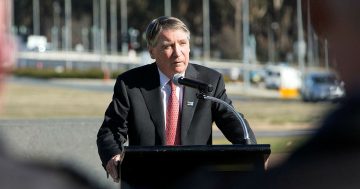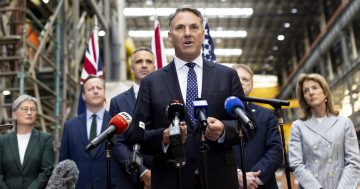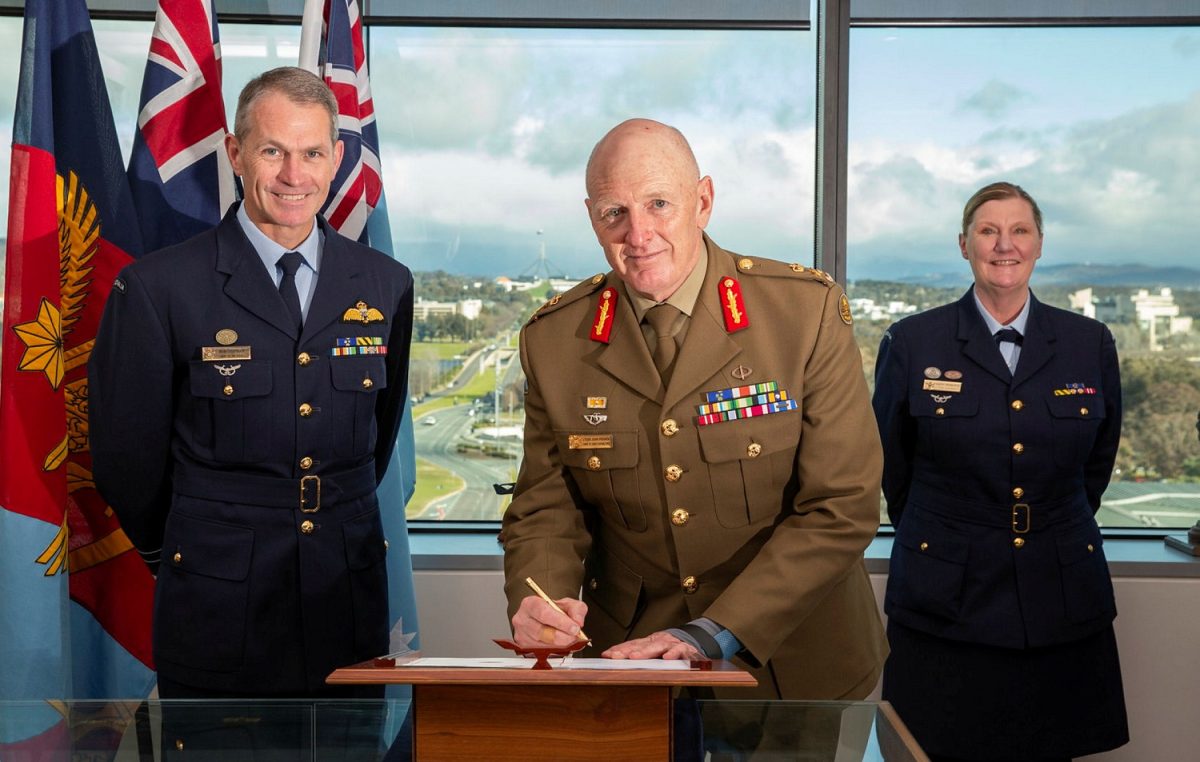
Chief of Air Force Air Marshal Rob Chipman (left) and Chief of Joint Capabilities Lieutenant General John Frewen sign the change of command for Space Command, watched on by Air Vice-Marshal Catherine Roberts. Photos: ADF.
The new financial year has seen some key structural changes within the Australian Defence Force take place.
Flagged in April’s Defence Strategic Review (DSR), the changes are designed to streamline some of the services’ capabilities and administration, or to take some key projects to the next stage.
Just a few days before 1 July, responsibility for Defence Space Command was transferred from the Royal Australian Air Force to the Joint Capabilities Group.
Stood up in January 2022 and led by Air Vice-Marshal Catherine Roberts, Space Command is responsible for delivering and managing a whole host of current and new ADF space and terrestrial-based capabilities over the next few decades.
Some of these capabilities include satellite-based communications (SATCOM), earth observation capabilities, terrestrial-based low-earth orbit observations telescopes and radars, and earth and space-based electronic warfare systems.
The Change of Command was signed by Chief of Air Force Air Marshal Robert Chipman and Chief of Joint Capabilities Lieutenant General John Frewen on 26 June in the presence of Air Vice-Marshal Roberts, to take effect from 1 July.
“Space is a critical element of the integrated force for every ADF operation, deployed and at home – from satellite communications, precision guided weapons, situational awareness in the battlespace, and position, navigation and timing,” Lieutenant General Frewen said in a social media post.
Air Marshal Chipman added: “It has been a pleasure hosting Air Vice-Marshal Cath Roberts and the Defence Space Command team. Space remains a key component of Defence’s integrated warfighting capability. So, it’s not a farewell, but rather a renewed commitment to work together.”
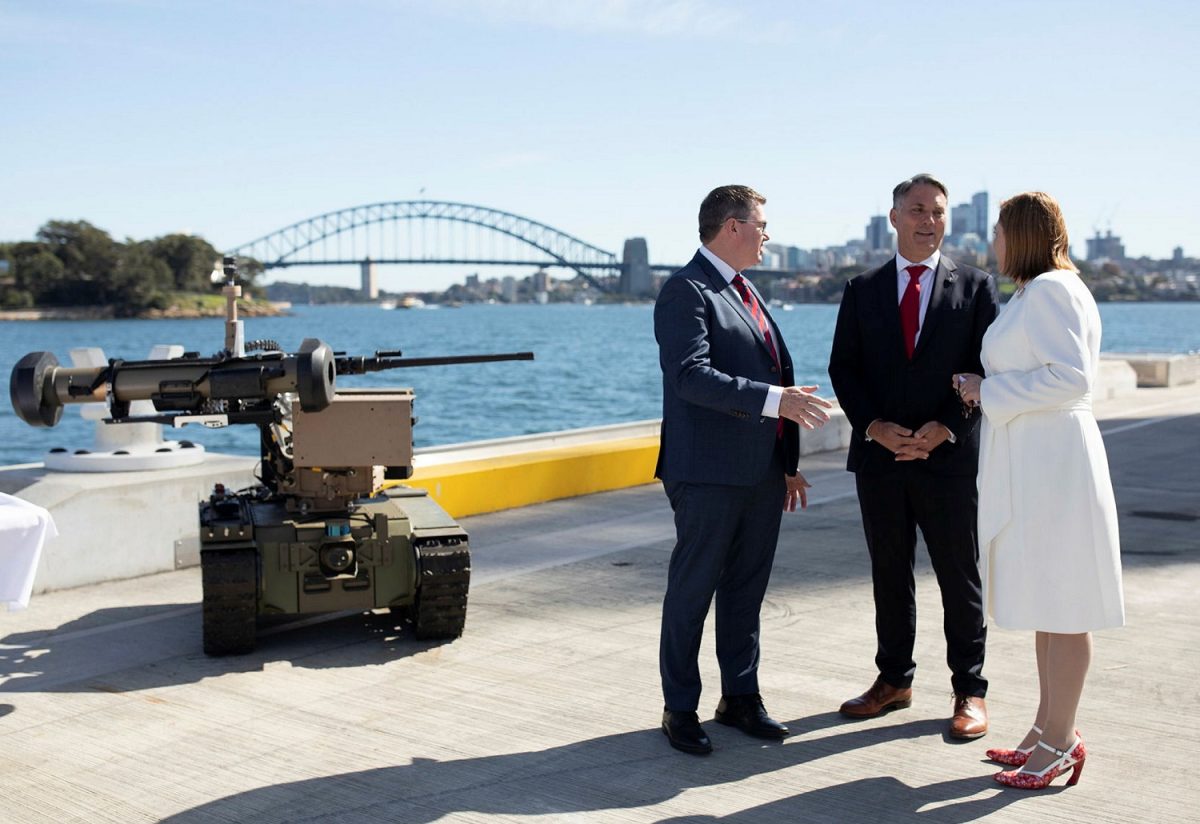
(L-R) Defence Industry Minister Pat Conroy, Deputy PM and Defence Minister Richard Marles, and Chief Defence Scientist Professor Tanya Monro at the 28 April ASCA announcement in Sydney.
Another change that came in on 1 July is the commencement of operations for the Advanced Strategic Capabilities Accelerator (ASCA).
First flagged in the DSR and launched in Sydney on 28 April, ASCA has been described by Defence as a “new and ambitious approach to transitioning game changing ideas into capabilities” to give the ADF an advantage.
Led by interim Head Professor Emily Hilder, ASCA is designed to call on experts inside and outside of Defence – including industry and academia – to partner and collaborate on the development of advanced systems and capabilities, including hypersonics, directed energy, trusted autonomy, quantum technology, information warfare, and long-range fires, some of which are part of Pillar Two of the trilateral AUKUS agreement between Australia, the US and the UK.
“The Accelerator is up and running less than three months since the Government received the Defence Strategic Review,” Minister for Defence Industry Pat Conroy said in a 1 July release.
“It will unlock and ignite innovation from across the nation, bringing together the best experts from different sectors – driving change from within Defence to move at the pace and scale we need,” he added.
“This will mean faster acquisition and better links between Defence and industry to deliver the capabilities the soldiers, sailors and aviators of the ADF need.”
ASCA will be funded to the tune of $748 million over the next four years, and $3.4 billion out to 2033.
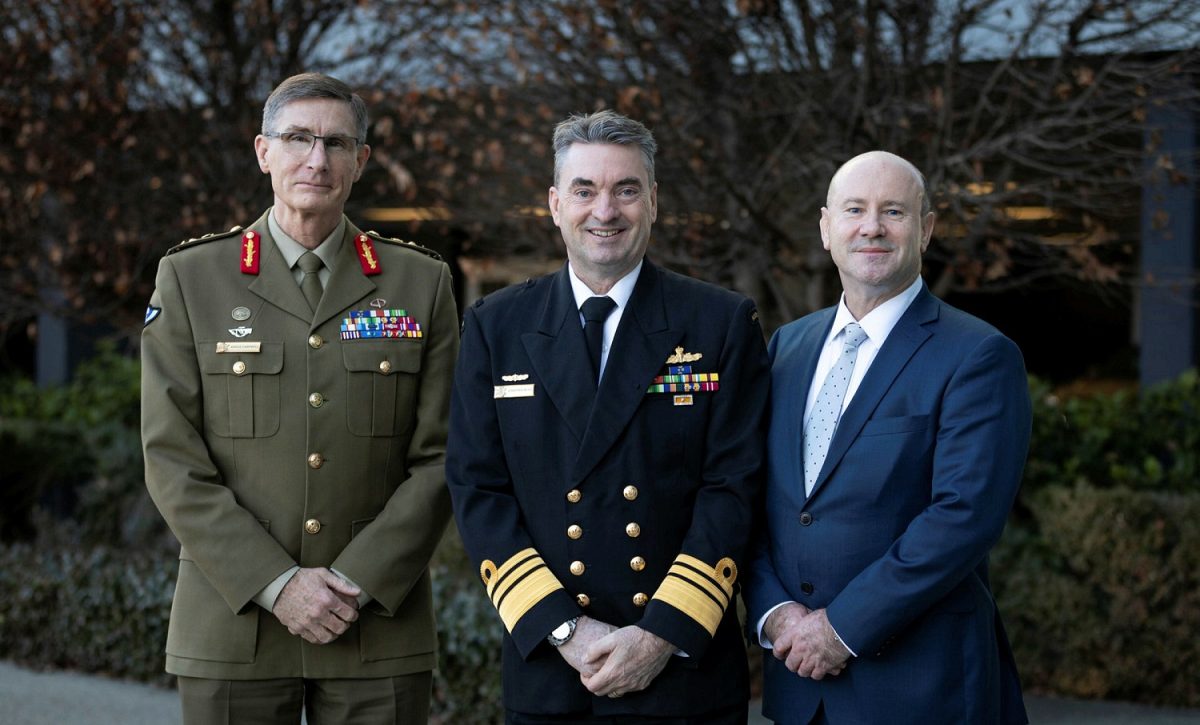
(L-R) Chief of Defence Force Angus Campbell, Director-General of the ASA VADM Jonathan Mead, and Defence Secretary Greg Moriarty at the standing up of the ASA.
Also launched on 1 July was the new Australian Submarine Agency (ASA).
Born out of the Nuclear-Powered Submarine Taskforce and led by Vice-Admiral Jonathan Mead, the ASA will be based in Canberra, and will switch from its previous role of providing advice to government on the best path forward to acquire a nuclear-powered submarine capability, to one of delivering that capability from 2032.
As Director-General of the ASA, Vice-Admiral Mead will lead an initial 350 staff from the ADF and Australian Public Service in securing the necessary industry partnerships, ADF and industry personnel placements and training in the US and UK, and liaising with US and UK government agencies as Australia’s program matures. The ASA is expected to grow to more than 680 staff by the end of 2024.
Rather than be part of the Royal Australian Navy, the ASA is a statutory agency reporting directly to the Defence Minister.
“This is a significant day, marking our next step towards the acquisition of conventionally-armed, nuclear-powered submarines, which is the single biggest investment in our defence capability in our history,” Deputy Prime Minister and Defence Minister Richard Marles said in a 1 July release.
“The Australian Submarine Agency will be critical in delivering a game-changing capability for the defence of Australia and security of our region.”
Minister Conroy added: “The Agency will play a critical role not only in growing and developing the Australian industrial base to deliver conventionally-armed, nuclear-powered submarines, but will also strengthen our partnership with the US and the UK, to deliver a stronger, more secure Australia and Indo-Pacific region.”
Original Article published by Andrew McLaughlin on Riotact.


